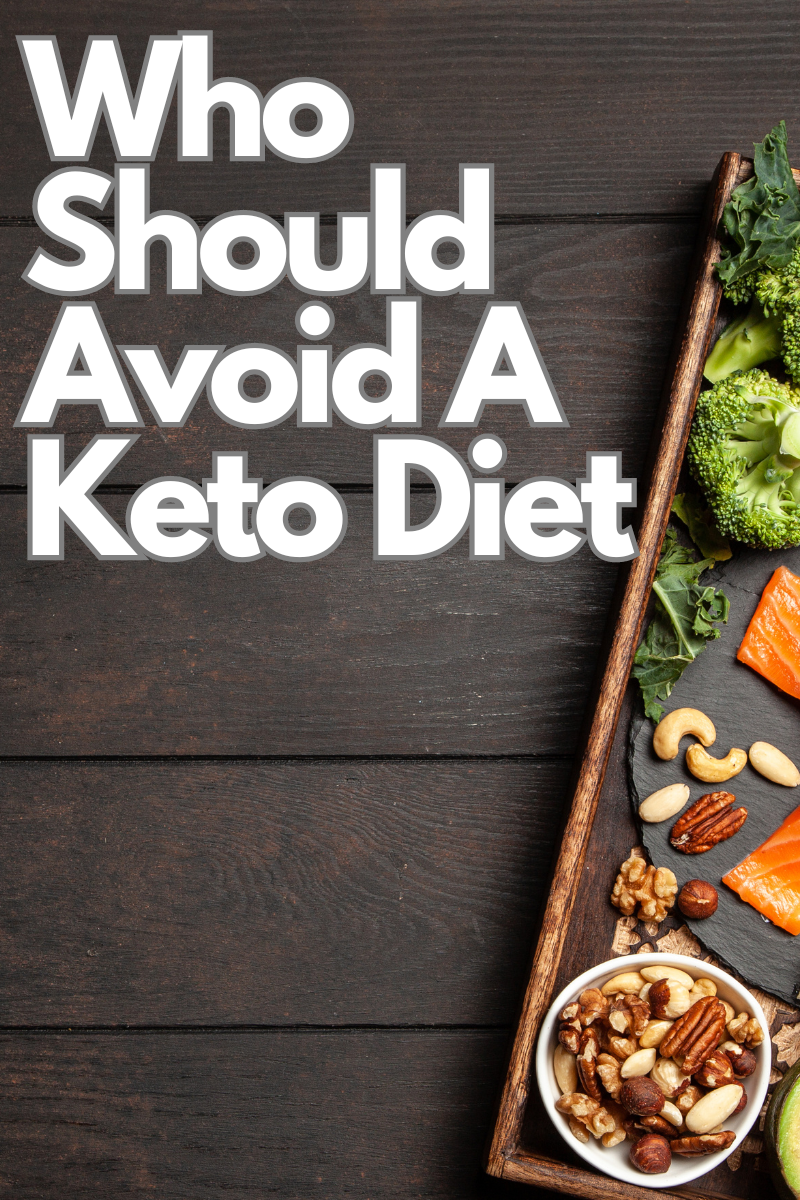This page contains affiliate links, meaning I get a commission if you decide to make a purchase through my links, at no additional cost to you.

The keto diet, has gained popularity in recent years for its potential weight loss and health benefits. However, there are certain groups of people who should avoid a keto diet for various reasons.
The keto diet can cause weight loss, also in the long term can lead to weight gain once discontinued. Consult a healthcare professional before starting a new diet, particularly if you have health conditions or take medication.
Key Takeaways:
- The keto diet may not be suitable for everyone.
- Children with epilepsy may benefit from the keto diet for seizure management.
- The diet is extremely strict and difficult to maintain.
- Consult a healthcare professional before starting the keto diet, especially if you have specific health conditions or take medication.
- Weight gain is possible once the keto diet is discontinued.
What Is Ketosis?
n ketosis, the body switches from using glucose as its primary fuel source to using ketone bodies produced from fat. To achieve ketosis, follow a high-fat, moderate-protein, low-carbohydrate ketogenic diet. Consume 75% of calories from fat, limit daily carbs to 20-50 grams, and get 15% of calories from protein.
When your body is in ketosis, it becomes efficient at burning fat for energy rather than relying on carbohydrates. This leads to weight loss and can have a positive impact on blood sugar control. By restricting your carbohydrate intake, your body is forced to break down fat stores for energy, resulting in fat burning.
However, achieving and maintaining ketosis can be challenging and may not be suitable for everyone. It requires careful meal planning and monitoring of macronutrient ratios. Ketosis is not the same as ketoacidosis, a dangerous condition seen in uncontrolled diabetes.
How Does Ketosis Work?
In a typical diet, your body primarily relies on carbohydrates to provide glucose, which is then used for energy. When you reduce carbs, your body’s glycogen stores become depleted, and it starts producing ketones from liver fat. These ketones can be used as an alternative fuel source.
As you continue to follow a low-carb, high-fat diet, your body increases its production and utilization of ketones. This shift in fuel source leads to fat burning and weight loss. It takes several days of carbohydrate restriction to enter ketosis and use ketones as its main source of energy.
Benefits of Ketosis
- Weight loss: Ketosis promotes fat burning and can lead to significant weight loss, especially in the initial stages of the diet.
- Blood sugar control: The ketogenic diet can help stabilize blood sugar levels and improve insulin resistance, making it beneficial for those with diabetes or prediabetes.
- Increased satiety: The high-fat content of the diet can help you feel full and satisfied, reducing cravings and promoting adherence to the diet.
- Improved mental clarity: Some people report increased mental focus and clarity when in ketosis.
It’s important to note that while ketosis can offer these potential benefits, it may not be suitable or necessary for everyone. Before starting a ketogenic diet, consult with a healthcare professional to determine if it’s appropriate for you and to ensure you’re following the diet safely.

Who Should Not Go Keto
While the keto diet can be beneficial for some, there are certain groups of people who should avoid it. It’s important to understand if you fall into one of these categories and consult with a healthcare professional before starting any diet, especially the keto diet.
Pregnant Women:
Pregnant women require higher levels of protein and may not get enough nutrients from a low-carb, high-fat diet like keto. It is important for both the mother and the developing baby to receive adequate nutrition during pregnancy.
Eating Disorders:
If you have a history of eating disorders, it is crucial to be cautious with restrictive diets like keto. These diets can trigger unhealthy patterns and may not promote a healthy relationship with food.
Hypothyroidism:
Individuals with hypothyroidism may experience worsened symptoms on a keto diet. The low-carb nature of the diet can affect thyroid function, leading to potential imbalances.
Gallbladder Disease:
Those without a gallbladder or with gallbladder disease may have difficulty digesting the high fat content of the keto diet. This can lead to digestive discomfort and potential complications.
Children:
Children have specific nutritional needs for growth and development, which may not be met on a keto diet. It is important to ensure they receive a well-rounded diet to support their overall health.
High-Performance Athletes:
High-performance athletes require ample energy and nutrients to support their intense training. The strictness of the keto diet may not provide sufficient fuel for optimal athletic performance.
Remember, everyone’s body is different, and it is important to consider your specific health needs and goals when choosing a diet. Consulting with a healthcare professional will help you determine the most suitable approach for your individual circumstances.

Dangers and Risks of the Keto Diet
The keto diet can be effective for weight loss and blood sugar control, but it does come with potential dangers and risks that you need to be aware of. Before embarking on a keto journey, it’s essential to understand the possible negative effects it can have on your body.
The Keto Flu
One of the common side effects of starting a keto diet is experiencing what’s commonly known as the “keto flu.” This temporary condition occurs as your body adjusts to the changes in macronutrient intake. Symptoms of the keto flu can include an upset stomach, dizziness, decreased energy levels, and mood swings. The keto flu usually subsides within a week or two as your body adapts to ketosis.
Nutrient Deficiencies
By following a keto diet, you restrict your intake of certain food groups, such as fruits, vegetables, and whole grains. While the diet emphasizes healthy fats and proteins, it can lead to potential nutrient deficiencies, as you may not be getting an adequate amount of essential vitamins, minerals, and fiber. It’s crucial to find alternative sources of these nutrients to ensure you maintain a balanced diet.
Increased Risk of Heart Disease
A high-fat diet, which is a hallmark of the keto diet, may increase the risk of heart disease, primarily when saturated fats from sources like red meat are consumed excessively. It’s important to make heart-healthy choices within the framework of a keto diet by opting for lean proteins and healthier fats, such as those found in avocados and nuts.
Low Blood Sugar
If you’re on diabetic medication or have diabetes, following a keto diet can affect your blood sugar levels. With the significant reduction in carbohydrates, you may need to adjust your medication dosage accordingly to prevent hypoglycemia or low blood sugar. It’s crucial to work closely with your healthcare provider to manage your blood sugar levels effectively.
Kidney Stones, Constipation, and Other Side Effects
Due to the high fat and low fiber content of a keto diet, some individuals may be prone to developing kidney stones and experiencing constipation. Furthermore, the social isolation that can occur due to the dietary restrictions of the keto diet may lead to feelings of loneliness or social exclusion. Additionally, those with a history of disordered eating may find the strict rules of a keto diet triggering. It’s important to consider these potential risks and evaluate whether the benefits of the diet outweigh the potential negative effects.
Before starting a keto diet, consult with a healthcare professional for personalized guidance and support. They can provide you with the necessary knowledge and help you make informed decisions about whether or not the keto diet is suitable for you.

Alternatives to the Keto Diet
If the keto diet is not suitable for you, there are many alternative dietary approaches that can promote weight loss and overall health. It is important to follow a balanced diet that includes a variety of food groups and provides essential nutrients. Instead of focusing solely on high-fat foods, incorporating lean protein, whole grains, fruits, and vegetables can help you achieve your health goals. Low-carb recipes and meal planning can still be a part of a healthy eating plan without the extreme restrictions of the keto diet. Consulting with a registered dietitian or healthcare professional can help you find the right approach that suits your lifestyle and goals.

Healthy Eating and Weight Loss
Following a healthy eating plan can promote weight loss and support overall health. Instead of relying on extreme diets like keto, focus on incorporating a variety of nutrient-dense foods into your meals. A balanced diet should include:
- Lean protein sources, such as chicken, fish, tofu, or legumes
- Whole grains, like quinoa, brown rice, or whole wheat bread
- Fruits and vegetables rich in vitamins, minerals, and fiber
- Healthy fats from sources like avocados, nuts, and olive oil
- Low-fat dairy products or alternatives, such as almond milk or Greek yogurt
By incorporating these food groups into your meals, you can create a balanced eating plan that supports weight loss and provides essential nutrients for overall health.
Low-Carb Recipes and Meal Planning
Even if you’re not following the keto diet, low-carb recipes and meal planning can still be a useful tool for weight loss and healthy eating. By reducing your intake of refined carbohydrates and processed foods, you can control your blood sugar levels and promote weight loss. Consider incorporating the following low-carb meal ideas into your weekly menu:
| Meal | Ingredients | Instructions |
|---|---|---|
| Grilled chicken salad | Grilled chicken breast, mixed greens, cherry tomatoes, cucumber, avocado, balsamic dressing | 1. Grill the chicken breast 2. Chop the vegetables 3. Combine all ingredients in a bowl and drizzle with balsamic dressing |
| Vegetable stir-fry | Mixed vegetables (broccoli, bell peppers, snap peas, carrots), tofu or shrimp, soy sauce, garlic, ginger | 1. Heat oil in a pan 2. Add garlic and ginger, sauté for a minute 3. Add vegetables and cook until tender 4. Stir in tofu or shrimp and soy sauce 5. Cook for another few minutes until everything is heated through |
| Salmon with roasted vegetables | Salmon fillet, broccoli, cauliflower, carrots, olive oil, salt, pepper, lemon | 1. Preheat oven to 400°F 2. Toss vegetables with olive oil, salt, and pepper 3. Roast in the oven for 20-25 minutes 4. Season salmon with salt, pepper, and lemon 5. Pan-sear the salmon until cooked through 6. Serve salmon with roasted vegetables |
Creating a meal plan and preparing meals in advance can help you stay on track with your healthy eating goals. By having nutritious meals ready to go, you can avoid making impulsive food choices and ensure you’re providing your body with the right fuel for weight loss and overall health.
Consulting with a Healthcare Professional
Choosing the right alternative diet plan for your needs can be challenging. Consulting with a registered dietitian or healthcare professional can provide personalized guidance and support. They can assess your individual health needs, dietary preferences, and weight loss goals to create a plan that works best for you.
“Working with a registered dietitian can help you develop a personalized meal plan that meets your nutritional needs while supporting your weight loss goals.” – Emily Johnson, RD
A healthcare professional can also address any specific concerns or medical conditions that may impact your diet choices. They can help you navigate food intolerances, allergies, or other dietary restrictions to ensure you’re getting the nutrients you need from your alternative diet plan.
Remember, it’s important to find an approach that is sustainable, enjoyable, and supports your long-term health goals. Consulting with a healthcare professional can provide you with the expert guidance and support needed to make informed decisions about your dietary choices.
Consult a Healthcare Professional
Before embarking on any new diet, it is crucial to consult with a healthcare professional who can provide you with the necessary medical advice and guidance. This is especially true for the keto diet, as it involves significant changes to your eating habits and nutrient intake. A registered dietitian or doctor can assess your specific health needs and goals to determine if the keto diet is safe and suitable for you.
Consulting a healthcare professional ensures that you receive personalized advice tailored to your individual needs. They can help you navigate the complexities of the keto diet and guide you in making informed decisions to minimize potential risks. They will take into account any pre-existing medical conditions or medications you may be taking, ensuring that the diet aligns with your overall healthcare plan.
Additionally, a healthcare professional can offer alternatives or modifications to the keto diet that can still support your weight loss and health goals. They can provide valuable insights on how to properly follow the diet, ensuring that you meet your nutritional requirements and avoid any adverse effects.
By consulting a healthcare professional, you gain access to expert knowledge and guidance, which is essential for embarking on a diet safely and effectively. They will work with you to create a plan that is not only safe but also sustainable in the long term, empowering you to make positive changes to your health and well-being.
Remember, your health is a priority, and seeking professional medical advice is crucial when considering any major dietary change. A trusted healthcare professional can offer invaluable support and advice throughout your keto journey, helping you achieve your health and weight loss goals.
Take the first step towards a healthier future by scheduling a consultation with a healthcare professional today!

Importance of Individualized Approach
Each individual is unique, and there is no one-size-fits-all approach to nutrition. It is crucial to consider your individual needs, health conditions, and dietary restrictions when choosing a diet plan. The keto diet may work well for some individuals, while others may need to explore alternative approaches that better suit their needs. The key is to find a plan that is sustainable, provides adequate nutrition, and supports your overall health and wellness goals.
Consulting with a healthcare professional or registered dietitian can help you find the right approach for you. They can take into account your personalized needs, understand your health conditions, and identify any dietary restrictions that you may have. By working closely with a professional, you can develop a personalized diet plan that aligns with your specific goals and ensures optimal results.
Whether you have specific health conditions like diabetes, cardiovascular disease, or food allergies, or if you have dietary restrictions such as being vegetarian or lactose intolerant, an individualized approach to your diet is essential. Your healthcare professional or dietitian can help you navigate these challenges by providing tailored recommendations and meal plans that meet your nutritional needs.
The Role of a Healthcare Professional or Registered Dietitian
A healthcare professional or registered dietitian is well-versed in understanding the complexities of nutrition and can provide expert guidance on creating a personalized diet plan. They will consider your personal preferences, lifestyle factors, and any underlying health conditions when designing a dietary approach that suits you best.
“A personalized diet plan is crucial in addressing your unique needs and ensuring that you are receiving the necessary nutrients to support your health and well-being.” – Dr. Sarah Johnson, Registered Dietitian
By consulting with a healthcare professional, you can gain valuable insights into optimizing your diet according to your individual needs, promoting long-term success and overall health. They can help you set realistic goals, track your progress, and make necessary adjustments along the way.
Remember, nutrition is not a one-time prescription but an ongoing journey. As your needs change over time, it is important to reevaluate and adapt your personalized diet plan to ensure continued success and well-being.

| Benefits of an Individualized Approach | Key Considerations |
|---|---|
|
|
While the keto diet can be effective for weight loss and blood sugar control, it is not suitable for everyone. Various groups of people, such as pregnant women, individuals with eating disorders, those with certain health conditions, and high-performance athletes, should avoid the keto diet.
The keto diet can pose risks such as nutrient deficiencies, heart disease, low blood sugar, kidney stones, and social isolation. It is crucial to consult with a healthcare professional before starting any new diet, especially if you fall into one of these categories.
Remember that there are alternative dietary approaches that can still support weight loss and overall health. It is important to find an individualized approach that suits your needs and goals.




